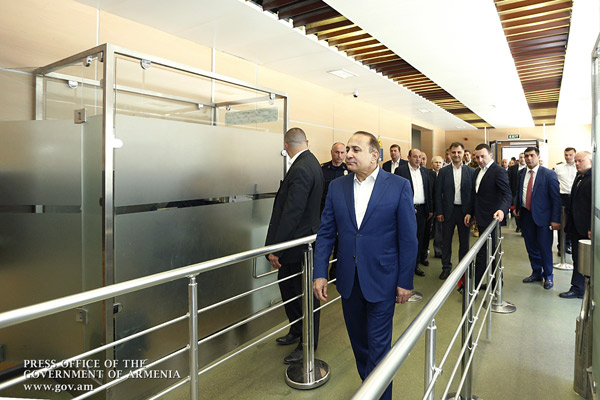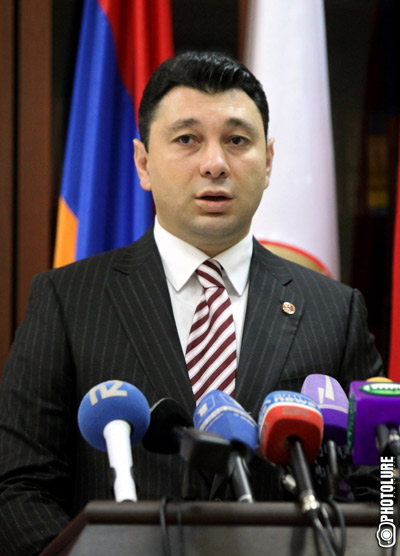Yesterday, at the National Assembly, Prime Minister Hovik Abrahamyan assured that every citizen of our country can import whatever he/she wants, “When people say that sugar is a monopoly, other kinds of foodstuff is monopoly, now I once again declare that any business entity who wants to be engaged in this business can do it. I’m going to be consistent, there will be no special approaches by any department, ministry or relevant authorities. There are going to be equal conditions, equal tax conditions and everybody must be equal under the same tax conditions. We are going to be consistent in this process.” In an interview with Aravot.am, economic commentator of “Haykakan Zhamanak” (Armenian Times) daily, Hayk Gevorgyan, has skeptical approaches to the Prime Minister’s assurances. Gevorgyan notes that if the prime minister says there will be no special approach by public authorities, he must also say whether there had been no such special approaches before or not, “If there had been, then they must be investigated and those responsible punished and the damages caused to the businesses must be reimbursed. If it “turns out” that there have been no such cases before, then there is no problem at all, and it is not clear why the Prime Minister announces that there will be no such approach. In other words, everything will be as it used to be, the monopolies will continue to exist, moreover, they will prosper and constantly expand at the expense of others.” Whether the public trusted the noble aspirations of the Prime Minister or not, it depends on the result of Abrahamyan’s activities.
Economic analyst Hayk Gevorgyan says that he will believe Abrahamyan in his true fight against monopolies if the Prime Minister will be able to answer a very simple question which was repeatedly raised, “During the whole year of 2015, the retail price of 1 kg of sugar in Russia cost 220 -240 drams, while in Armenia – 340 drams. Can the Prime Minister explain why no business entity did not bring at least 1 kg of sugar from Russia and sell it for 300 drams here? Why did not any business want to get huge profits in a matter of hours? Let the Prime Minister answer that during the whole year of 2015, 1 kilogram of banana in Russia cost 320-400 drams, while in Armenia – 1000 drams. Why was not there anyone to start importing cheap banana and receive huge profit? As long as I have not listened to logical answers to these questions, I will not believe this statement.” Gevorgyan specifically indicates what will happen to the person who would dare to import sugar or bananas, “If any business imports banana or sugar, his good will pass a customs clearance at a control price – an astronomical number. But when these same goods are imported by today’s monopolists, their goods pass the customs clearance with a bill of the invoice and several times cheaper. If after the statement of the Prime Minister, from the very next morning, the customs checkpoint terminates profligacy – making the customs clearance of all good, absolutely all goods by “control price”, I will believe. I suggest tomorrow morning to go to the customs checkpoint and see whether small or “uncovered up” businesses are able to pass the customs clearance of at least one goods by the bill of invoice. If we find such a case, I will believe that the situation has been changed. If all this is missing, then the recent bombastic speeches and assurances are tales and balloons.”
Minister of Economy Artsvik Minasyan sees the need for legislative changes in the fight against monopolies. He assured that by the new Constitution, there will be a demand for the anti-monopoly law, and as the Minister said, “First of all, there is a need for legislative review, secondly, a review and specification toolset.” In response to our question whether the eliminations of monopolies in Armenia depend on a new law or the political will, Hayk Gevorgyan said, “Anti-monopoly, even the most perfect and the toughest law cannot operate in Armenia if there is no political will to abolish monopolies or at least to minimize the impact. Any monopolist can “slice” his business into 100 parts and register by the name of his mother-in-law, cousin, neighbor or folks of the neighbor and thus everything will be accomplished. But if there is a political will, desire and ability, even with the most imperfect and weak legislation, it is possible to abolish the monopolies.”
Read also
Nell BABAYAN




























































